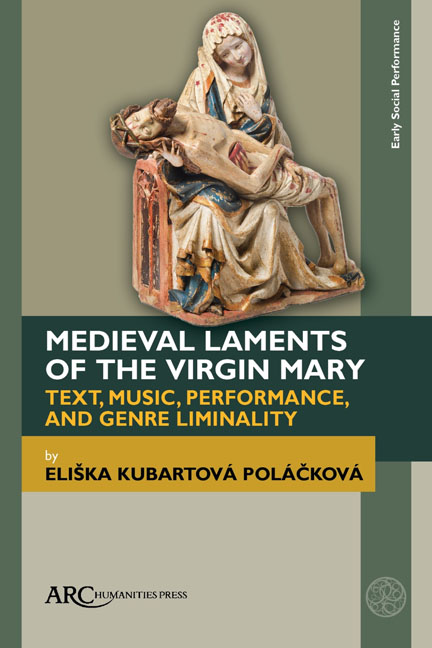Book contents
- Frontmatter
- Contents
- List of Illustrations
- Preface
- Introduction. The Suffering of the Virgin Mary as an Inner Drama
- Chapter One Marian Lament and Medieval Piety
- Chapter Two Genre, Mediality and Aesthetics
- Chapter Three Modes of Performance
- Chapter Four Bohemian Laments: Feeling Like a Woman, Thinking Like a Man. Or Not?
- Appendix: Bohemian Marian Laments — Excerpts
- Bibliography
- Index
Chapter Four - Bohemian Laments: Feeling Like a Woman, Thinking Like a Man. Or Not?
Published online by Cambridge University Press: 28 December 2023
- Frontmatter
- Contents
- List of Illustrations
- Preface
- Introduction. The Suffering of the Virgin Mary as an Inner Drama
- Chapter One Marian Lament and Medieval Piety
- Chapter Two Genre, Mediality and Aesthetics
- Chapter Three Modes of Performance
- Chapter Four Bohemian Laments: Feeling Like a Woman, Thinking Like a Man. Or Not?
- Appendix: Bohemian Marian Laments — Excerpts
- Bibliography
- Index
Summary
THE CORPUS OF Marian laments from medieval Bohemia (approximately corresponding to the area of what is today the Czech Republic) does not, in many respects, reach the variety of devotional motifs, poetic strategies, and pragmatic schemes known from similar corpora from other European regions. The indigenous Bohemian laments also appear slightly later than did the planctus in France, Italy, and Germany, the manuscripts with the extant versions of the individual compositions coming from the fourteenth century, though it is presumed that some of them could be transcriptions of earlier works. Such comparably later occurrence of Marian lament in Bohemian literary tradition parallels the situation with other forms of writing, since, before 1300, literary production in the Czech lands was rather scarce in comparison with that of Western Europe (with outstanding exceptions of, for example, the Codex Gigas, the largest extant illuminated manuscript from medieval times, or the thirteenth-century tradition of German minnesäng cultivated in the Bohemian royal and aristocratic courts). In the first decades of the fourteenth century, with the introduction of the Luxembourg ruling dynasty to the Czech throne in the person of John the Blind (1296‒1346) and particularly of his son, Emperor Charles IV, Bohemia experienced an unprecedented cultural and economic upswell. Combined with favourable historical conditions, such as the Great Famine and the pandemics of the Black Death, which erased perhaps up to sixty percent of the population of Europe during the first half of the fourteenth century, but bypassed the Czech kingdom, the fourteenth century in the region saw breath-taking development in architecture, sculpture, panel and mural painting, and book illumina tion, as well as writing. An ambitious political, devotional, and cultural programme, enthusiastically supported by the Emperor and his circle of elite intellectuals, authors, and artists from all parts of Europe, this cultural boost was intended to raise Prague, the country's capital, to the position of the religious centre of medieval Europe, second only to Jerusalem.
- Type
- Chapter
- Information
- Medieval Laments of the Virgin MaryText, Music, Performance, and Genre Liminality, pp. 169 - 198Publisher: Amsterdam University PressPrint publication year: 2023



